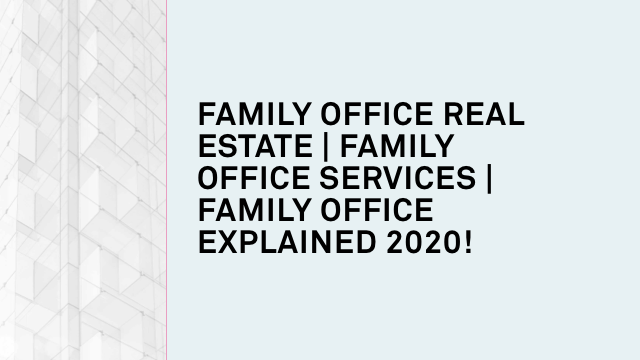Table of Contents
There has been much written about the influx of institutional capital entering the real estate market. However, falling more under the radar, has been the money family offices are investing in real estate.
Family offices are a relatively newfound phenomenon. As they have really only become popular over the past few decades. As the number of ultra-high-net-worth individuals has increased, so has their commonness of them.
These offices are now major players in the real estate investment market. They have an especially strong influence in the multifamily realm given their overwhelming preference for this real estate asset class.
In this article, we provide a detailed look at family office real estate investments.
What is a family office?
Family offices are a unique and discrete form of organization that has grown in popularity since the 1980s. These office manage the wealth of single or multiple families. This can include but is not limited to their investment portfolios.

The offices can also manage the wealth and assets of their families. Most manage portfolios worth tens or hundreds of millions of dollars each.
These offices are designed to operate discretely. Ultimately, to avoid publicity and protect the privacy of their beneficiaries.
As a result, the information about them can be rather limited.
According to a 2019 study, there were an estimated 7,300 family offices globally. 3,100 in North America with an estimated net worth of at least $150 million.
However, as an investor, the role and importance of these offices can not be denied. For the past 10 years, they have steadily grown in their presence in the real estate market.
Family offices are a unique and discrete form of organization that has grown in popularity since the 1980s.
They are increasingly competing with institutional investors and private equity firms for deals. A significant amount of this capital is being invested explicitly into multifamily properties.
Roles and Responsibilities of a Family Office

While the exact services provided by a family office can vary, most provide some combination of the following financial services:
- Financial planning, including investment advice and risk management
- Optimization of investment portfolios across all asset classes
- Detailed accounting and regular reporting of asset performance
- Insurance analysis and management
- Generational wealth and estate planning
- Strategies for philanthropic giving
- Property and asset management
- Assistance with purchasing high-value property (e.g., property and aircraft)
- Select legal services
- Tax advice and regulatory compliance
- Personal lines of credit
- Business and family travel
Types of Family Offices
As briefly stated above, these offices can be structured to oversee the wealth of single families or multiple families. However, there is another type of family office, called an outsourced family office. We look at each type in greater detail below.
- Single Family Office (SFO)
Single-family offices, which despite their name have nothing to do with single-family real estate. Instead, these are the offices that oversee the assets of just one family. SFOs are generally utilized when a family has a net worth exceeding that of $100 million. (Some experts have suggested that unless a family has more than $500 million to manage, the costs to run an SFO—an approximate 1 million— may not be worth it.)
- Multi Family Office (MFO)
High-net-worth families with at least $25 million in assets often join multifamily offices or (MFOs) rather than creating their own family office. MFOs have teams of specialists who can work with each family based on their goals and preferences, and can leverage the group’s collective wealth.
For example, all of the families represented by the MFO, to invest in larger deals. This opens the door to more attractive investment options that each individual family may not have access to otherwise. On a per-family basis, MFOs tend to be more affordable; most offices charge fees between $50,000 and $500,000 per year. This cost-sharing model attracts families who still want access to high-touch service and significant investment expertise.
- Outsourced Family Office (OFO)
An outsourced family office (OFO). This is when an individual representing a family is the main point of contact with different third-party professionals.
These third-parties, which can be financial advisors, accountants, tax advisors, lawyers, etc., don’t only work for the office. They provide services to the OFO as needed.
An OFO can be substantially more cost effective than an SFO or MFO. OFOs, however, have less control than they would if all third parties were internal employees working in specialized roles.
Holding Company vs. Family Office
The terms “holding company” and “family office” are often used alike. However, they are two unique entities. A family office is a holistic, full balance sheet management solution for ultra-high-net-worth individuals or families.
Whereas a holding company is simply a portfolio of business equity stakes. Similar to that of family offices. Many holding companies are designed to easily invest in business opportunities that arise. However, a holding company does not provide the same hands-on management as a family office.
Family Office Investments in Real Estate
A 2021 study of family offices found that 86% of family offices remain bullish on the economy. An estimated 46% of North American family offices indicated that they would be seeking new investment opportunities in 2022. Many of these investments will be in real estate. Less than 4% of family offices indicated that they would cut back their real estate portfolios.
A 2021 study of family offices found that 86% of family offices remain bullish on the economy.
This comes as no surprise since real estate is the third most popular asset class for family offices to invest in. Nearly 80% of these offices invest in some type of real estate.
By some estimates, real estate makes up an average 22.7% of family offices’ investment portfolios.
The most popular sector family offices in North America invest in our residential homes/multifamily apartments (88%). Followed by office investments (56%) and industrial/logistics (46%). Retail (35%) and hotels (29%) are less favorable asset classes among family offices.
A study by FORE magazine confirms that the number one property type among family offices is multifamily. Their survey finds that 76.4% of families like to invest in this asset class.
When asked about their investments in real estate, family offices were quoted as follows:
“Offices are very challenging right now, obviously … We focus on the few places that you can get good quality yields in today’s environment. And the tax benefits are just tremendous, so yes, I think we’ll continue to allocate.” -CEO of a Tennessee-based family office
“We have a mix of real estate investments, and I want to continue to put our money into real estate.” -Principal of a single family office in California
“We have a number of legacy real estate positions we’ve held onto. We’ve also been approached by various funds to invest in new deals. We looked at opportunity zone projects and chose not to invest in them. Like many family offices, we were really concerned about how COVID-19 was going to impact valuations. I think real estate got oversold. We’re seeing prices bounce back now, much faster than what anyone would have expected, so we probably should have invested more than we did.” -Managing director of a Massachusetts-based MFO
In other words, for the same reasons individuals are interested in investing in real estate (e.g., tax benefits, economic resiliency). So are family offices. These offices also report investing in real estate. Oftentimes, this is because it is a hard asset that can create a legacy for future generations.
How Family Offices Invest in Real Estate
There are generally five ways that family offices invest in real estate.
1. Maximum exposure to real estate.
If the family has obtained their wealth through real estate, likely they will maintain the high exposure to it as well. These families tend to have robust real estate experience.
2. Internal real estate platforms.
There are some families that opt to set up their own real estate investment platform. The family office then runs these platforms.
This is often the case when families are interested in investing in real estate, but may not hold any previous experience. These platforms then generally need to hire experts to manage real estate properly.
3. Passive investments in real estate.
Some family offices do not have the expertise or bandwidth to manage real estate.
Instead, the office will work with a skilled sponsor to passively invest in real estate. During this, the sponsor oversees the property management, providing updates and reporting directly to the family office.
Most family offices will invest with four or five sponsors at a time. This helps to diversify their portfolios and mitigate risk.
Initial investments through a MFO may range from $250,000 to $5 million or more, and can increase once the MFO is comfortable with a sponsor.
4. Real estate ETFs and mutual funds.
A small number of families invest in real estate ETFs and mutual funds. These families tend to do so when their real estate knowledge is very limited. Nonetheless, the family still wants exposure to real estate.
5. Real estate lending.
As cap rates have compressed, more family offices are making private real estate loans. They are attracted to the lien being secured by real property. With interest rates on the rise, the returns can be quite compelling.
An estimated 31% of family offices have increased their private lending over the past 12 months. Due to the rise in competition for assets. Private lending has become the new and less crowded space for these offices to gravitate towards.
Conclusion
Family offices control trillions of dollars in assets, many in the real estate sector. Understanding their investment strategy is important for sponsors seeking capital. Family dynamics may change how they feel about asset classes, risk. As well as specific markets may also change.
Most important to note. Sponsors must understand that these offices are attentively focused on their client’s wealth preservation. Sponsors who incorporate capital preservation into the core of their business strategy. Oftentimes place themselves in a good position to work with family offices in the future.
FAQ
How much money do you need to start a family office?
The amount needed to start a family office will depend on the number of assets, the insurance needs, tax planning, the complexity of the structure needed for management, and much more. The average for a smaller single-family financially focused family office is approximately $50 million or more. However, it is recommended by many experts that without $500 million or more, managing the cost to run an SFO annually may not be worth it.
Do family offices pay capital gains tax?
Family offices are subject to capital gains taxes on any investment income they earn, just like any other entity. However, they may be able to take advantage of certain tax strategies and structures to minimize their tax liability.
Are family office fees tax deductible?
This will often depend greatly on how the family office is structured. In general, expenses related to the management and preservation of income-producing assets may be tax deductible. However, the IRS has strict rules regarding what constitutes a valid business expense, and it’s important to consult with a tax professional or financial advisor to understand the tax implications of any family office fees.
The family office can be structured as a partnership, LLC, or corporation so it can be treated as a business with tax deductions. However, if the family office is considered a “gratuitous arrangement” by the IRS, then the fees may not be tax-deductible.
Do family offices have a fiduciary duty?
A family office may have a fiduciary duty, which is a legal obligation to act in the best interest of the client. The exact nature of the duty will depend on the type of services provided and the relationship between the family office and the family. It is important to consult with legal and financial professionals to understand the fiduciary duty of a specific family office.
What is the average size for a family office?
While this of course can vary depending on the family’s needs ranging from as few as 2 to around 350 or more individuals. The average for a small family office is around 6 employees and can cost a significant $1 to $2 million to operate annually. As for a mid-sized family office depending on the assets needed to be managed this can require upwards of 15 people to operate needing a budget ranging $3 to $5 million. A large family office ranging from 25 to 30 individuals and an average of around $8 to $10 million. Whereas some of your even larger family offices can take upwards of 40 to 50 with an annual budget running $14 to $20 million!
How much does it cost to maintain a family office?
The cost of maintaining a family office can vary widely depending on factors such as the size and complexity of the family’s assets, the number of family members involved, and the level of services provided. Some estimates suggest that the cost of maintaining a single-family office can range from 0.5% to 2% of the family’s active assets under management, but it could be higher or lower depending on the specific circumstances. Some of the expenses that may be incurred in maintaining a family office include staff salaries, office rent and expenses, legal and accounting fees, and investment management fees.
Do family offices invest in startups?
Family offices invest in a multitude of different areas including private equity, venture capital, opportunities, commercial real estate, hedge funds as well as startups. In 2021 Family offices also had a record $120 billion in startups.




